Sleep plays a vital role in our health and well-being. Many people struggle to get enough quality rest each night, which can impact their mood, energy, and overall health. Improving sleep habits can lead to better physical and mental functioning during the day.

What to do before bed to sleep better:
Watch the video NOW!
There are many simple yet effective ways to enhance sleep quality. By making small changes to daily routines and sleep environments, most people can achieve more restful and restorative sleep. This article will explore 20 practical tips that can help readers sleep better at night and wake up feeling refreshed.
1) Maintain a consistent sleep schedule

Going to bed and waking up at the same times each day helps regulate the body’s internal clock. This practice supports the natural sleep-wake cycle, making it easier to fall asleep and wake up.
Aim to keep the same schedule on weekends and holidays. Consistent sleep times train the body to expect sleep at certain hours, promoting better quality rest.
Sticking to a sleep schedule can improve overall sleep quality. It may take time for the body to adjust, but patience will pay off with more restful nights.
Avoid large shifts in sleep times. If changes are necessary, adjust gradually in 15-30 minute increments over several days.
Set alarms for both bedtime and wake time to reinforce the schedule. This helps create a routine and reminds you when it’s time to start winding down for the night.
Consistency is key. The more regular the sleep schedule, the more likely the body will naturally feel tired and awake at the right times.
2) Create a restful sleeping environment

A calm and comfortable bedroom is key for good sleep. Keep the room cool, ideally between 60-67°F (15-19°C). Use blackout curtains or an eye mask to block out light.
White noise machines or earplugs can help mask disruptive sounds. Choose a supportive mattress and pillows that suit your sleeping position.
Invest in soft, breathable bedding. Cotton sheets and blankets are often a good choice. Remove clutter from the bedroom to create a peaceful atmosphere.
Consider using calming scents like lavender. An essential oil diffuser can add a relaxing aroma to the room. Keep electronic devices out of the bedroom or at least away from the bed.
Use dim, warm lighting in the evening. Bright lights can disrupt your body’s natural sleep-wake cycle. A small bedside lamp is often sufficient for reading before bed.
Make sure the room is well-ventilated. Fresh air can improve sleep quality. Regular cleaning of the bedroom also helps maintain a restful environment.
3) Limit daytime naps
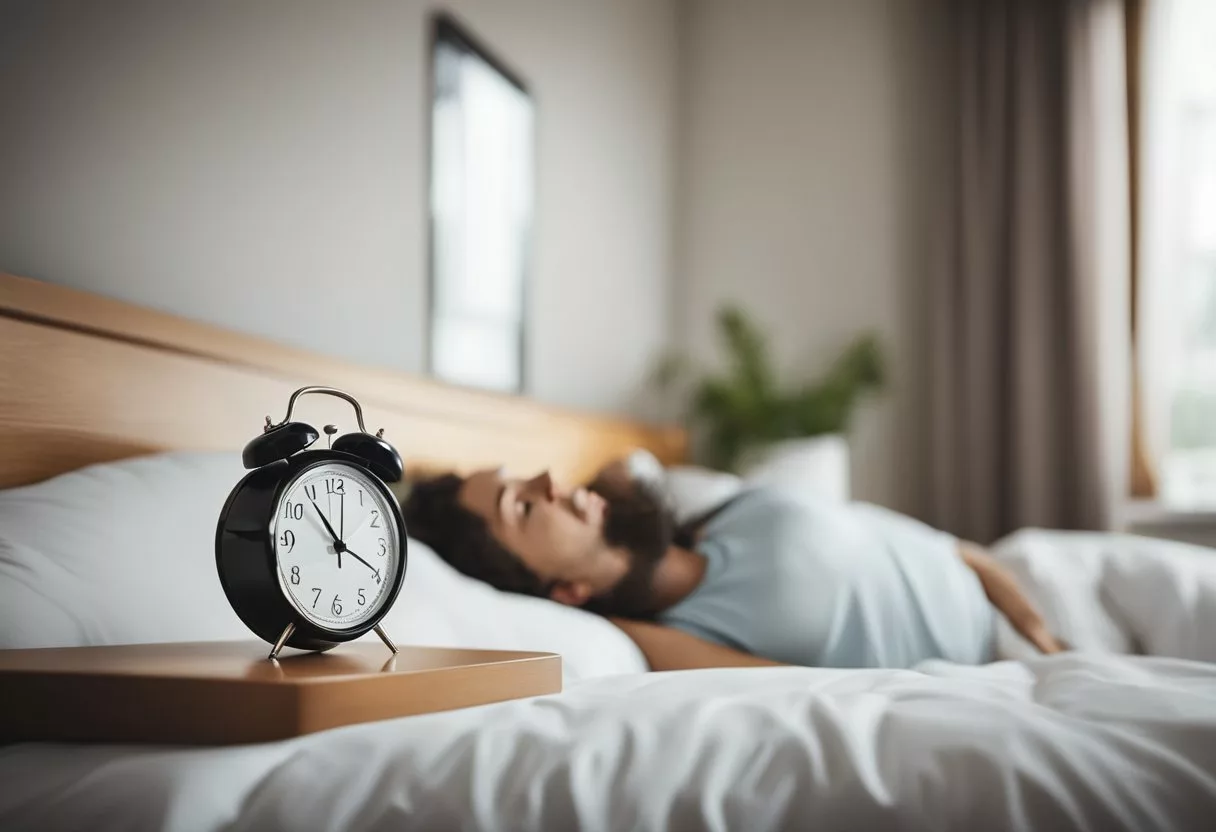
Napping can be helpful, but it’s important to be careful about when and how long you nap. Short naps of 10 to 20 minutes are usually best for most people.
Longer naps can make you feel groggy and interfere with your nighttime sleep. It’s best to avoid napping after 3 p.m., as this can make it harder to fall asleep at night.
The ideal time for a nap is in the early afternoon, shortly after lunch. This timing aligns with the body’s natural dip in alertness.
If you find yourself needing long naps frequently, it might be a sign that you’re not getting enough nighttime sleep. In this case, it’s better to focus on improving your nighttime sleep habits.
For some people, even short naps can disrupt nighttime sleep. If you have trouble sleeping at night, it may be best to avoid naps altogether and focus on getting a full night’s rest.
4) Avoid large meals before bed

Eating big meals close to bedtime can disrupt sleep. The body needs time to digest food before lying down. Large meals make the digestive system work harder, which can keep people awake.
Heavy meals may cause discomfort and acid reflux when lying flat. This can lead to trouble falling asleep or waking up during the night. It’s best to eat dinner at least 2-3 hours before bed.
If hunger strikes late at night, a small snack is better than a full meal. Some good bedtime snacks include fruits like kiwi or bananas. These contain sleep-promoting nutrients without being too heavy.
Spicy or fatty foods are especially bad before bed. They can cause indigestion and heartburn. Caffeine and alcohol should also be avoided in the hours before sleep.
Drinking too much liquid before bed can lead to nighttime bathroom trips. It’s wise to limit fluids in the evening. This helps prevent sleep interruptions from a full bladder.
5) Manage stress and anxiety

Stress and anxiety can make it hard to fall asleep. People who feel worried often have racing thoughts at bedtime. This can keep them awake for hours.
To manage stress, try relaxation techniques like deep breathing or meditation before bed. These methods can calm the mind and body.
Regular exercise during the day can also reduce stress levels. Even a short walk can help clear the mind and improve sleep quality.
Creating a bedtime routine can signal to the body that it’s time to relax. This might include reading a book, taking a warm bath, or listening to soothing music.
Limiting caffeine and alcohol intake, especially in the evening, can also help. These substances can increase anxiety and disrupt sleep patterns.
For those with persistent anxiety, talking to a therapist may be helpful. They can provide strategies to manage anxious thoughts and improve sleep habits.
Writing down worries before bed can also be effective. This practice helps clear the mind and prevent racing thoughts during the night.
6) Exercise regularly

Regular exercise can improve sleep quality. It helps people fall asleep faster and stay asleep longer.
Moderate aerobic activities like cycling, running, or swimming are good choices. These exercises raise heart rate and release feel-good chemicals in the brain.
Yoga is another great option. It combines posture improvement, breathing exercises, and meditation. Yoga can reduce stress and pain, which often interfere with sleep.
The timing of exercise matters. Most people should avoid intense workouts close to bedtime. Exercise raises core body temperature, which can make falling asleep harder.
For best results, people should aim to finish exercising at least 1-2 hours before bed. This gives the body time to wind down.
Consistency is key. Regular exercise, even in short bursts, is better than occasional long workouts. Aim for at least 30 minutes of moderate exercise most days of the week.
7) Limit caffeine and alcohol intake

Caffeine and alcohol can disrupt sleep patterns. Caffeine may stay in your system for up to 10 hours after consumption, affecting sleep quality and duration.
To improve sleep, it’s best to avoid caffeine in the afternoon and evening. This includes coffee, tea, energy drinks, and some sodas.
Alcohol might help people fall asleep faster, but it often leads to poor sleep quality. It can prevent deep sleep and REM sleep, which are crucial for feeling rested.
Experts suggest stopping alcohol consumption at least a few hours before bedtime. This allows the body to metabolize the alcohol before sleep.
Water intake should also be moderated in the evening. Drinking too much water close to bedtime can lead to nighttime bathroom trips, disrupting sleep.
By limiting these substances, especially in the hours before bed, people can improve their chances of getting restful sleep.
8) Establish a pre-sleep routine

Creating a consistent bedtime routine can help signal to your body that it’s time to wind down. This routine should start about 30 minutes before you plan to sleep.
A good pre-sleep routine might include relaxing activities like reading, stretching, or listening to soothing music. These activities can help ease the transition from wakefulness to sleep.
Some people find it helpful to take a warm bath or shower as part of their routine. The drop in body temperature after getting out of warm water can promote sleepiness.
Dimming the lights and turning off electronic devices is another important part of a pre-sleep routine. Bright screens can interfere with the body’s natural sleep-wake cycle.
Practicing gratitude before bed can also promote better sleep. Writing in a gratitude journal can create feelings of peace and contentment, making it easier to drift off.
Consistency is key when it comes to a pre-sleep routine. Doing the same activities in the same order each night helps reinforce the signal to your body that it’s time to sleep.
9) Keep electronics out of the bedroom
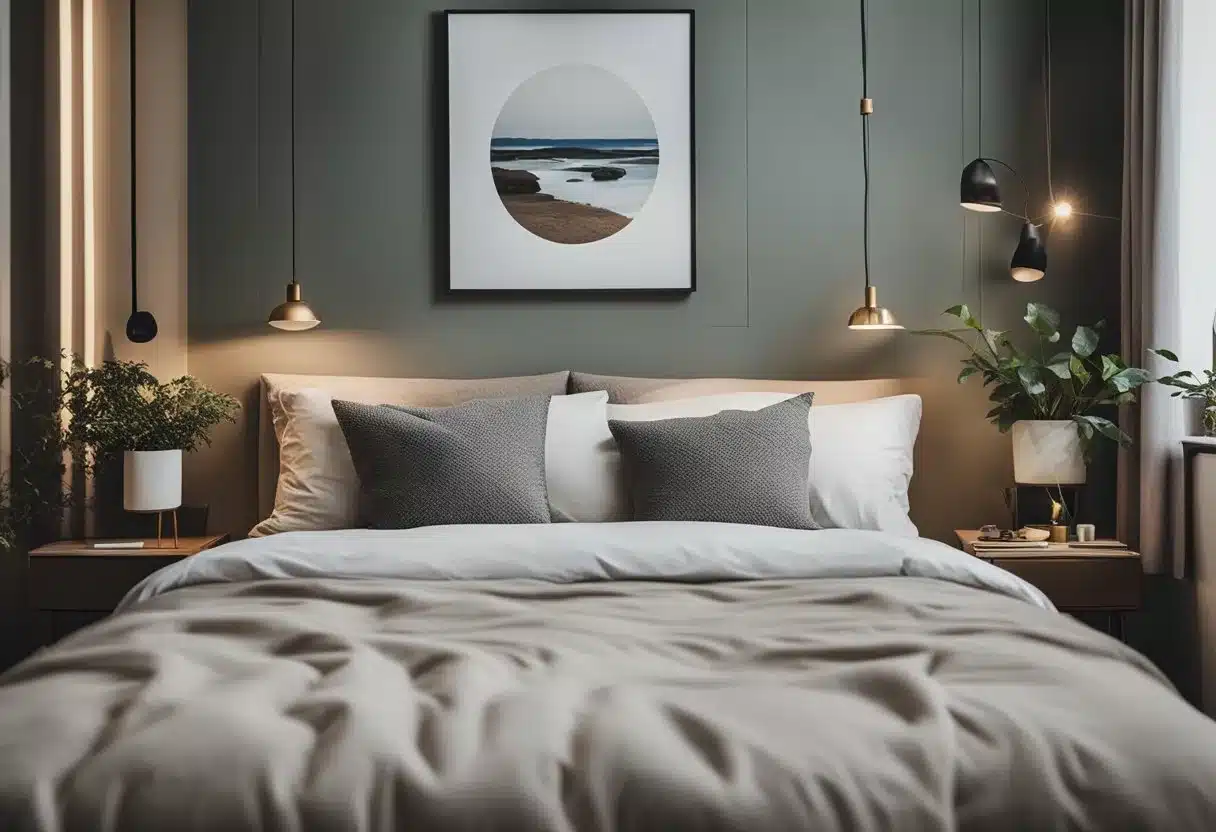
Electronic devices can disrupt sleep patterns. About 70% of adults use electronic devices in their bedroom or in bed. This habit can negatively affect both sleep quantity and quality.
The blue light emitted by screens interferes with the body’s natural sleep-wake cycle. It suppresses melatonin production, making it harder to fall asleep.
Removing all electronics from the bedroom creates a more peaceful sleep environment. This includes smartphones, tablets, laptops, and televisions.
For those who use their phone as an alarm, consider buying a traditional alarm clock instead. This eliminates the temptation to check devices before bed or during the night.
Setting a technology curfew can be helpful. Try turning off all electronic devices at least one hour before bedtime. This allows the mind to relax and prepare for sleep.
Keeping electronics out of the bedroom also reduces distractions. It prevents late-night scrolling or binge-watching that can eat into valuable sleep time.
10) Use comfortable bedding
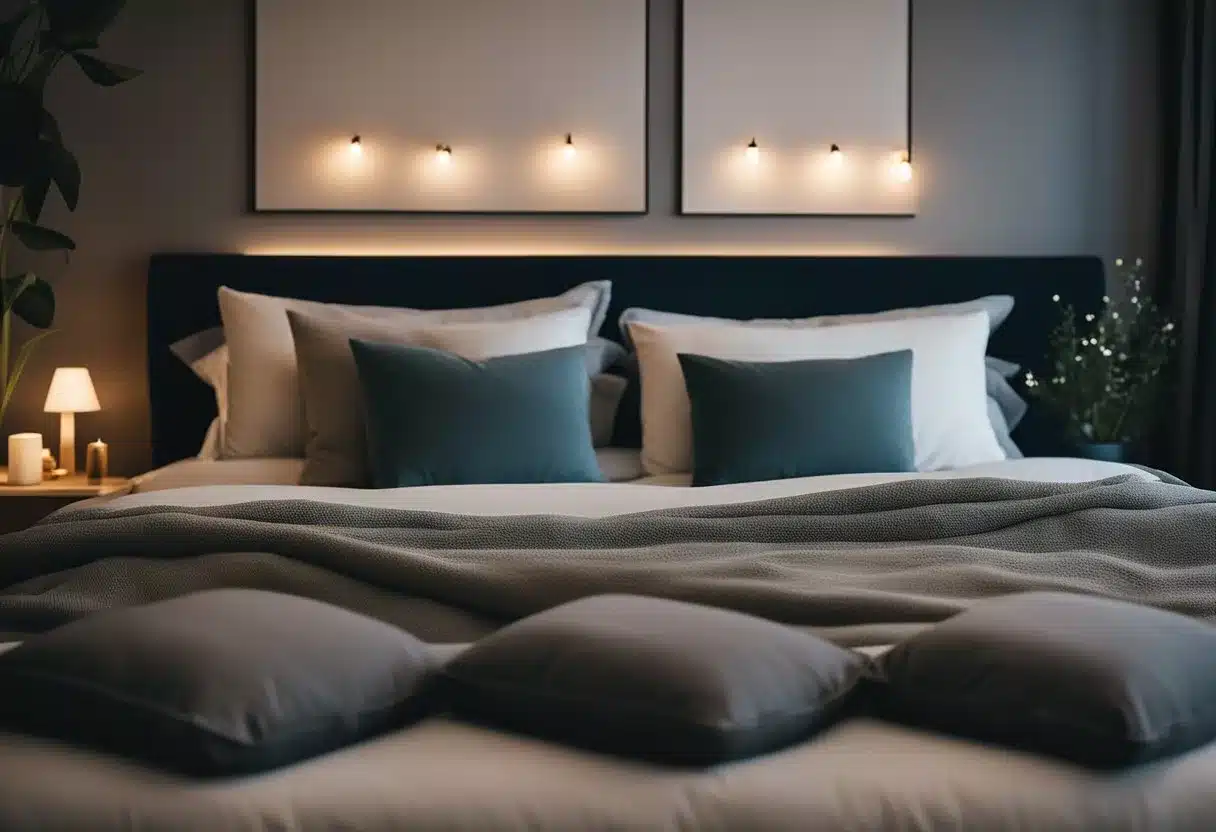
Good bedding is key for a restful night’s sleep. Choosing the right mattress and pillow can lead to deeper relaxation and better sleep quality.
Soft, breathable sheets help regulate body temperature. Cotton, bamboo, and linen are popular choices for their cooling properties.
The right pillow supports your head and neck. Memory foam and latex pillows offer good support, while down or down alternative pillows provide a plush feel.
A cozy comforter or duvet keeps you warm without overheating. Choose a weight that suits your climate and personal preferences.
Mattress toppers can add an extra layer of comfort to your bed. They come in various materials like memory foam, latex, or down alternative.
Don’t forget about blankets and throws. These can add warmth and texture to your bedding setup.
Regularly washing your bedding keeps it fresh and hygienic. This can improve sleep quality and reduce allergens.
11) Consider white noise machines
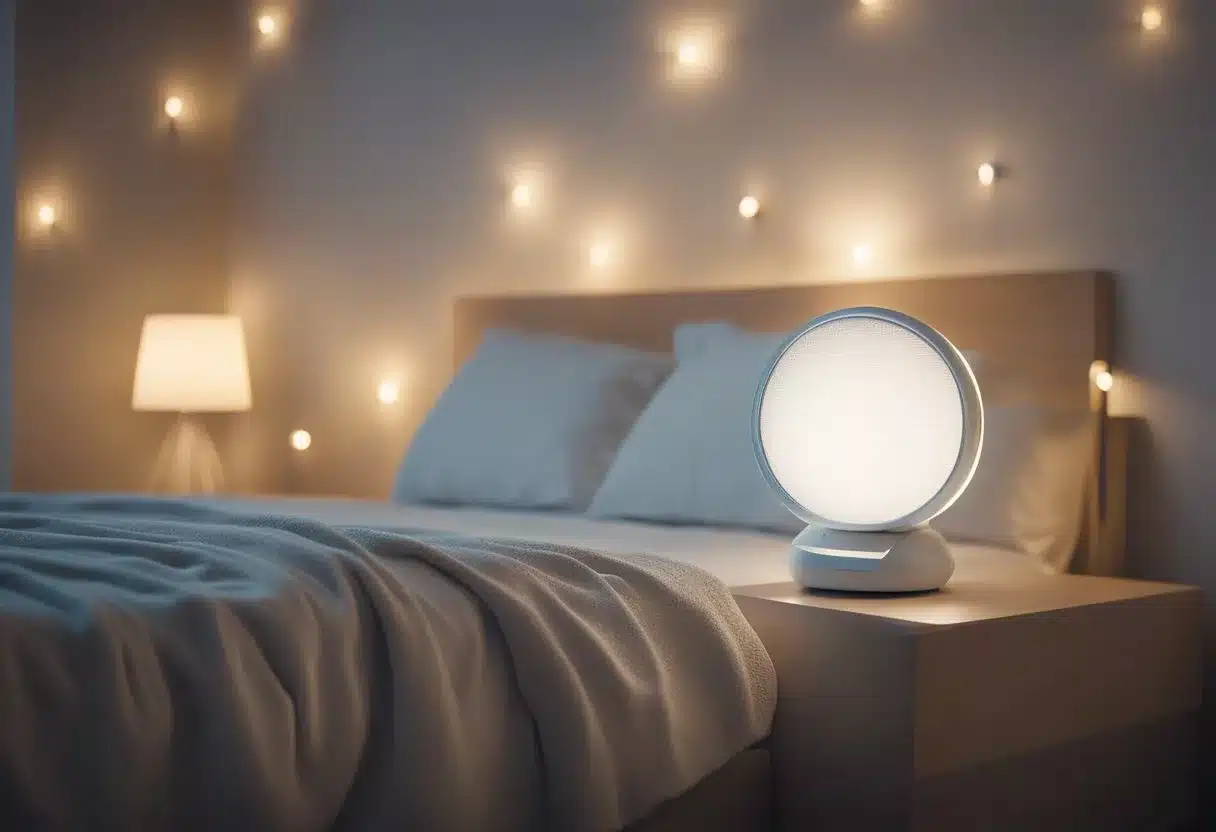
White noise machines can help create a soothing environment for sleep. These devices produce consistent background sounds that mask disruptive noises.
Many white noise machines offer a variety of sound options. These often include fan noises, rainfall, and ocean waves. Some devices even have 20 audio selections to choose from.
Portable white noise machines are great for travel. They help maintain a familiar sleep environment away from home. Some models are compact enough to fit in a suitcase easily.
Features like sleep timers can be useful. They allow the machine to turn off automatically after a set time. This saves battery life and prevents unnecessary noise throughout the night.
For parents, white noise machines can be helpful for babies and kids. They can create a consistent sound environment that promotes better sleep for little ones.
When choosing a white noise machine, consider factors like sound quality, volume control, and power options. Some models run on batteries, while others need to be plugged in.
12) Try aromatherapy

Aromatherapy uses essential oils to promote relaxation and better sleep. Some scents can help calm the mind and prepare the body for rest.
Lavender is one of the most popular essential oils for sleep. It has a soothing effect that may reduce stress and improve sleep quality.
Other helpful scents include chamomile, vanilla, and cedarwood. These oils can be used in different ways. People often put a few drops in a diffuser or on their pillow before bed.
Some studies show promising results. In one study, older adults with dementia slept longer when essential oils were placed on towels near their pillows.
Another study found that using lavender and fennel oils reduced stress and improved sleep. The oils were given through the nose for three months.
To try aromatherapy, start with a small amount of oil. Make sure to use high-quality, pure essential oils. It’s best to test for any allergies before using them regularly.
13) Keep the bedroom cool

A cool bedroom helps you sleep better. The ideal temperature for sleep is around 65°F (18°C). When your room is too warm, it can make it hard to fall asleep and stay asleep.
There are several ways to keep your bedroom cool. Use lightweight, breathable bedding to avoid trapping heat. Cotton sheets and light blankets work well in warm weather.
Draw the curtains or blinds during the day to block out sunlight and heat. This helps keep the room cooler when night falls.
Use fans to circulate air. A ceiling fan or portable fan can make a big difference. For extra cooling, place a bowl of ice in front of the fan to create a DIY air conditioner effect.
If possible, open windows at night to let in cooler air. Close them in the morning to trap the cool air inside. This natural method can help maintain a comfortable temperature.
Consider using a dehumidifier if the air feels sticky. Lower humidity can make the room feel cooler and more comfortable for sleep.
14) Ensure proper lighting
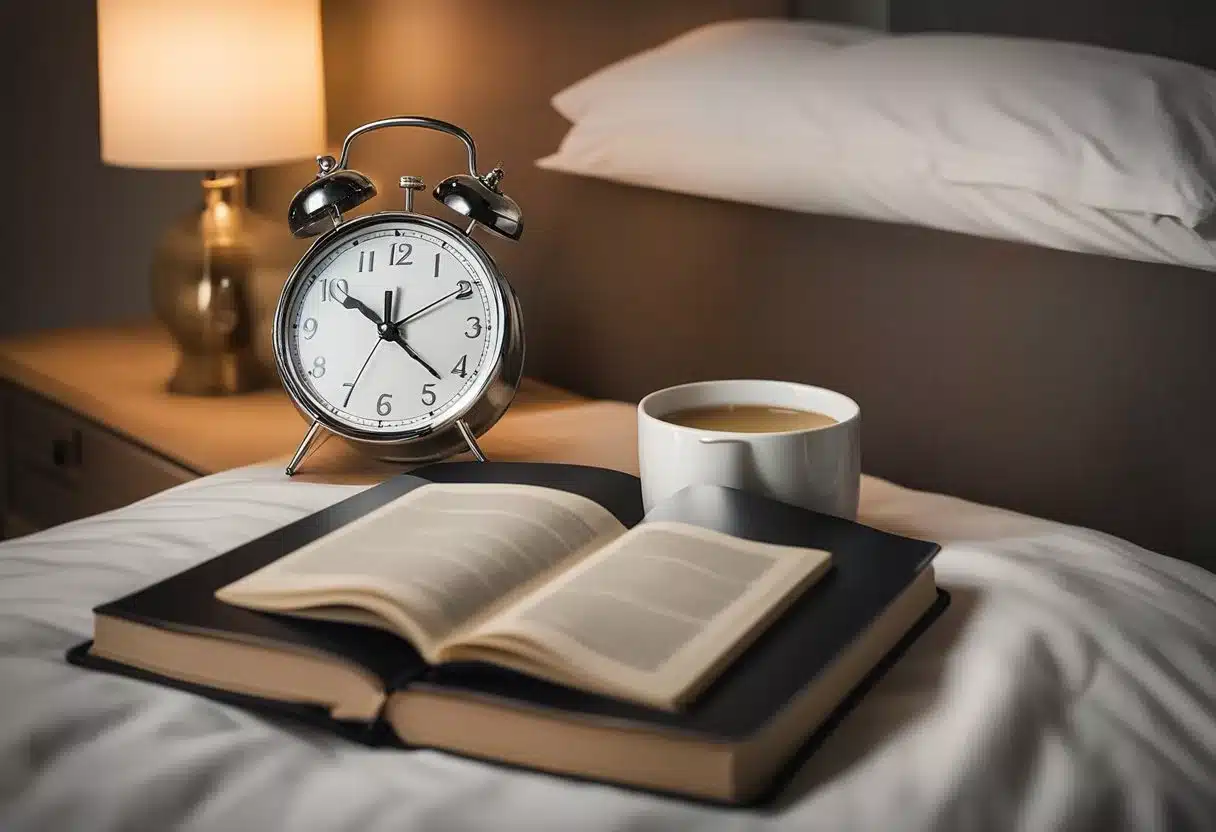
Proper lighting plays a key role in getting better sleep. Bright light during the day helps keep your body’s internal clock on track.
Try to get sunlight exposure early in the day. This boosts alertness and sets your body’s natural rhythms.
As evening approaches, dim the lights in your home. This signals to your body that it’s time to wind down.
Avoid blue light from screens before bed. The blue glow can trick your brain into thinking it’s still daytime.
Use warm, soft lighting in the bedroom. This creates a calm mood that helps you relax.
Blackout curtains can block outside light that might disturb your sleep. They’re great for night shift workers or those in bright urban areas.
If you need to get up at night, use a small nightlight. This prevents you from turning on bright overhead lights that could wake you up fully.
15) Limit screen time before bed
Using screens before bedtime can make it harder to fall asleep. The blue light from devices tricks the brain into thinking it’s still daytime. This can mess up the body’s natural sleep-wake cycle.
Many people use phones, tablets, or computers in bed. This habit lowers sleep quality. It’s best to stop using screens at least an hour before sleep.
Instead of screens, try relaxing activities. Reading a book, listening to soft music, or doing light stretches can help the mind wind down.
For those who must use devices, there are ways to reduce the impact. Many phones and computers have night mode settings. These lower blue light output. Blue light filters can also help protect eyes from digital strain.
Creating a bedtime routine without screens is important. This might include having tea, doing skincare, or gentle exercises. Such habits signal to the body that it’s time to sleep.
16) Avoid stimulating activities in the evening
The hours before bedtime are crucial for good sleep. It’s best to steer clear of activities that wake up the mind or body. These can make it hard to fall asleep and get quality rest.
Intense exercise should be avoided close to bedtime. While exercise is great for sleep overall, doing it too late can be disruptive. It’s better to finish workouts at least 2-3 hours before bed.
Screen time is another big sleep disruptor. The blue light from phones, tablets, and computers can trick the brain into thinking it’s daytime. It’s wise to put these devices away at least an hour before bed.
Work-related tasks should also be set aside in the evening. Checking emails or finishing projects can be stressful and keep the mind active. Instead, it’s helpful to focus on relaxing activities like reading or gentle stretching.
Eating heavy meals or drinking caffeine late at night can also interfere with sleep. The body needs time to digest food, and caffeine is a stimulant. It’s best to finish eating a few hours before bedtime and limit caffeine intake in the afternoon.
17) Try meditation or deep breathing exercises
Meditation and deep breathing can help calm the mind and body before sleep. These practices reduce stress and promote relaxation, making it easier to drift off.
One simple technique is the 4-7-8 breathing method. Inhale for 4 seconds, hold for 7 seconds, then exhale for 8 seconds. Repeat this cycle a few times to slow down breathing and heart rate.
Guided imagery is another effective approach. It involves visualizing peaceful scenes or experiences to distract from anxious thoughts and induce sleepiness.
Progressive muscle relaxation can also be helpful. This technique involves tensing and relaxing different muscle groups in sequence, promoting physical and mental relaxation.
Many smartphone apps offer guided meditations specifically designed for sleep. These can be a good starting point for beginners who want structure and guidance.
Consistency is key with these practices. Regular use of meditation or breathing exercises can lead to improved sleep quality over time.
18) Use blackout curtains
Blackout curtains can be a game-changer for sleep quality. These special curtains are designed to block out external light, creating a dark environment that promotes better sleep.
Blackout curtains can improve sleep and overall health. They are especially helpful for people who need to sleep during daylight hours, such as shift workers.
The darkness created by blackout curtains helps regulate the body’s natural sleep-wake cycle. This can lead to more restful and uninterrupted sleep throughout the night.
Blackout curtains also offer temperature control benefits. Their dense materials can help maintain an optimal sleep temperature of around 65 degrees Fahrenheit (18 degrees Celsius).
An added bonus of blackout curtains is their ability to reduce noise. This can be particularly beneficial for those living in noisy urban environments.
Installing blackout curtains is a simple and affordable way to create an ideal sleep environment. They can be easily added to existing windows and are available in various styles to match different decor preferences.
19) Ensure mattress support
A supportive mattress is key for good sleep. It keeps the spine aligned and helps prevent aches and pains. A sagging or worn-out mattress can disrupt sleep and cause discomfort.
Investing in a supportive mattress is crucial for comfort and relaxation. The right mattress provides proper support for the spine, reducing the risk of back pain.
Different mattress designs can affect sleep quality and pain levels. Some people may benefit from firmer mattresses, while others prefer softer options. It’s important to choose a mattress that suits individual needs and preferences.
Mattress support can be enhanced with additional accessories. A mattress topper can add an extra layer of comfort and support. High-quality pillows also play a role in maintaining proper spinal alignment during sleep.
Regular mattress maintenance is essential. Rotating the mattress every few months can help prevent uneven wear. Upgrading pillows can also improve overall sleep comfort by providing better support for the head and neck.
20) Write down your worries
Many people find it hard to fall asleep because their minds are full of worries. A simple way to deal with this is to write down your concerns before bed.
Keeping a worry journal can help clear your mind. Take a few minutes each night to jot down any thoughts that are bothering you.
This practice can make it easier to let go of stress. When worries are on paper, your brain doesn’t need to keep thinking about them.
Writing a to-do list for the next day can also be helpful. People who wrote down tasks they needed to complete fell asleep faster than those who didn’t.
It’s best to keep your journal by your bed. This way, if new worries pop up as you’re trying to sleep, you can quickly write them down.
Some people prefer to write a list of things they’re grateful for instead. This can put you in a more positive mood before sleep.
Remember, the goal is to relax your mind. Don’t spend too long writing. A few minutes should be enough to help you feel more at ease and ready for sleep.
Understanding Sleep Cycles
Sleep cycles consist of different stages that repeat throughout the night. These stages play crucial roles in rest and recovery. Knowing how sleep cycles work can help improve sleep quality.
The Stages of Sleep
Sleep has four main stages. Stage 1 is light sleep where you doze off. Your heart rate and breathing slow down. Stage 2 involves further slowing of body functions.
Stage 3 is deep sleep. Your muscles relax fully. This stage is key for feeling refreshed. Stage 4 is REM sleep. Your brain becomes more active and dreaming occurs.
A full sleep cycle lasts about 90-120 minutes. Most people go through 4-6 cycles per night. The first cycles have more deep sleep. Later cycles have more REM sleep.
REM vs Non-REM Sleep
Sleep is divided into REM (rapid eye movement) and non-REM sleep. Non-REM includes stages 1-3. REM sleep is stage 4.
In non-REM sleep, your body repairs tissues and builds bone and muscle. Your immune system gets stronger. REM sleep helps with learning and memory. Your brain processes information from the day.
Both types of sleep are needed. Adults should get about 20-25% REM sleep each night. Lack of REM sleep can affect mood and cognitive function. Too little non-REM sleep can leave you feeling tired and unfocused.
Creating the Ideal Sleep Environment
Your bedroom setup plays a big role in sleep quality. Key factors include lighting, temperature, and noise levels. Making small changes in these areas can lead to better rest.
Lighting and Darkness
A dark room helps promote good sleep. Excess light can disrupt sleep, so use blackout curtains or an eye mask.
Avoid bright screens before bed. The blue light from phones and tablets can make it harder to fall asleep. Try using night mode on devices or wearing blue light blocking glasses in the evening.
For nighttime bathroom trips, use dim night lights. This helps you see without fully waking up. In the morning, exposure to natural light helps reset your body clock. Open curtains or step outside for a few minutes after waking up.
Optimal Room Temperature
The ideal bedroom temperature is between 60-71°F (15.6-22°C). A cool room helps your body’s natural drop in temperature during sleep.
Use breathable bedding and pajamas to prevent overheating. If you tend to get cold, warm socks can help. They increase blood flow and may help you fall asleep faster.
A fan can provide both cooling and white noise. For precise control, a smart thermostat can adjust temperatures throughout the night.
Noise Control
A quiet room is best for sleep. Use earplugs or a white noise machine to block out disruptive sounds. White noise apps on your phone can also work well.
Soundproof your room by sealing gaps around doors and windows. Heavy curtains can muffle outside noise too. If you live in a noisy area, consider a sound machine that mimics nature sounds like rain or ocean waves.
For couples with different sleep schedules, use separate blankets to reduce movement noise. Soft rugs can absorb sound from footsteps. Remember, sudden loud noises are more disruptive than constant background sounds.
The Role of Nutrition in Sleep Quality
What you eat and drink affects how well you sleep. Some foods help you rest, while others can keep you up at night. Nutrients also play a key part in sleep quality.
Food and Drink to Avoid Before Bed
Certain foods and drinks can make it hard to fall asleep or stay asleep. Caffeine, alcohol, and high-fat foods should be avoided close to bedtime. Caffeine can stay in your system for hours and make it tough to drift off.
Alcohol might help you fall asleep faster, but it often leads to worse sleep quality later in the night. It can cause you to wake up more and get less deep sleep.
Spicy or heavy meals right before bed can cause discomfort and acid reflux. This makes it hard to relax and fall asleep. Big meals also make your body work on digestion when it should be resting.
Sugary snacks can give you a quick energy boost, which is not ideal for bedtime. They can cause blood sugar spikes and crashes that mess with sleep.
Essential Nutrients for Better Sleep
Some nutrients can help improve sleep quality. Tryptophan, found in foods like turkey and milk, helps make serotonin and melatonin. These chemicals help control sleep cycles.
Magnesium plays a role in regulating sleep. It’s found in nuts, seeds, and leafy greens. Magnesium can help relax muscles and calm the nervous system.
Vitamin B6 aids in making melatonin. Good sources include fish, potatoes, and non-citrus fruits. Getting enough B6 can help keep sleep patterns regular.
Foods with melatonin can also boost sleep quality. Tart cherries, nuts, and some fish contain this sleep hormone. Eating these foods might help people fall asleep faster and wake up less at night.
Frequently Asked Questions
Sleep can be tricky. Many factors affect rest quality. These tips address common sleep concerns.
What strategies can help me sleep better with anxiety?
Anxiety can make sleep hard. Deep breathing helps calm the mind. Try the 4-7-8 method: breathe in for 4 counts, hold for 7, exhale for 8.
Relaxing for 30 minutes before bed can ease anxiety. Read a book, listen to soft music, or do gentle stretches.
What dietary changes can promote healthier sleep patterns?
Diet affects sleep. Avoid caffeine after 2 PM. Limit alcohol, which can disrupt sleep cycles.
Eat light meals before bed. Heavy foods can cause discomfort. Try a small snack with protein and carbs, like cheese and crackers.
What are some effective methods to fall asleep quickly?
Falling asleep fast takes practice. A cool, dark room helps. Use blackout curtains and set the thermostat to 60-67°F.
Try the military method: Relax your face, drop your shoulders, and breathe slowly. It may help you drift off in 2 minutes.
How can I consistently sleep through the night without interruptions?
Waking at night is common. Stick to a regular sleep schedule, even on weekends. This trains your body’s internal clock.
Limit liquids before bed to reduce bathroom trips. Keep the room quiet or use white noise to mask sounds.
Which techniques can help me wake up feeling refreshed?
Waking refreshed starts the night before. Go to bed at a consistent time. Aim for 7-9 hours of sleep.
In the morning, expose yourself to bright light. This helps reset your body clock. Stretch or do light exercise to boost energy.
Can you describe the 10-3-2-1-0 sleep rule and its effectiveness?
The 10-3-2-1-0 rule sets guidelines for better sleep. 10 hours before bed, stop caffeine. 3 hours before, no more food or alcohol.
2 hours before, stop work. 1 hour before, no more screens. 0 snooze button in the morning. This helps create a consistent sleep routine.